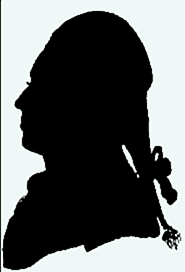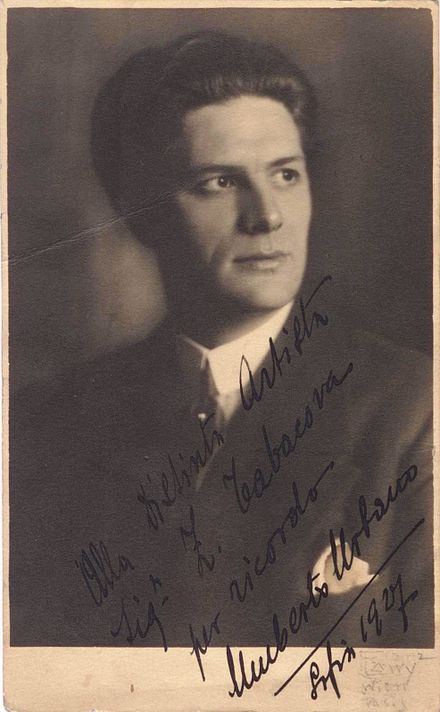
Eine florentinische Tragödie, Op. 16, is an opera in one act by Alexander von Zemlinsky to a libretto adapted by the composer from a German translation by Max Meyerfeld of Oscar Wilde's unfinished play A Florentine Tragedy.

Adelaide di Borgogna, ossia Ottone, re d'Italia is a two-act opera composed by Gioachino Rossini to a libretto by Giovanni Schmidt. It was premièred at the Teatro Argentina in Rome on 27 December 1817.
Dano Raffanti is an Italian tenor, particularly associated with the Italian baroque and bel canto repertory.

Der lustige Krieg is a three-act operetta composed by Johann Strauss II. The work was first performed on 25 November 1881 at the Theater an der Wien. Its libretto was by F Zell and Richard Genée. The operetta was well received at its premiere, and was performed 69 times during its first run.

Il re is a novella or opera in one act and three scenes by composer Umberto Giordano to an Italian libretto by Giovacchino Forzano. The opera premiered at La Scala in Milan on 12 January 1929.
Calliroe is a melodramma eroico or opera in 2 acts and 23 scenes by composer Giuseppe Farinelli. The work uses an Italian language libretto by Gaetano Rossi. The work premiered at La Fenice in Venice on 3 January 1808 in a double bill with the house premiere of Urbano Garzia's ballet Il calunniatore punito ossia Il conte Lenosse.
Dezső Ernster was a Hungarian opera singer who sang leading bass roles with the New York Metropolitan Opera from 1946 to 1963. In 1929, he created the role of Baron d'Houdoux in Hindemith's Neues vom Tage.
Francesco Mottino was an Italian opera singer, voice teacher, drama teacher, librettist, and writer. He had a prolific international opera career from the 1850s through the 1870s. After retiring from the stage, he worked actively as a writer and teacher in his native country.
Cesare Galeotti was an Italian composer, conductor, and concert pianist. He is best known for his opera Anton which he conducted at its highly lauded premiere at La Scala on 17 February 1900. His other opera Dorisse premiered at La Monnaie in Brussels on 18 April 1910 under the baton of Sylvain Dupuis and with mezzo-soprano Claire Croiza performing as Alays. In addition to writing operas, he also composed a considerable amount of symphonic music.

Robert vom Scheidt was a German operatic baritone. He created roles in several world premieres, including Wolf in Franz Schreker's Das Spielwerk und die Prinzessin (1913), Vitellozzo Tamare/Andrea in Schreker's Die Gezeichneten (1918), Baliv in Schreker's Der Schatzgräber (1920), and Rabbi Leone in Eugène d'Albert's Der Golem (1926).
Giacomo Vaghi was an Italian opera singer who had an active international career from 1925-1956. Along with Tancredi Pasero and Ezio Pinza, he was one of the leading operatic basses of his generation. He possessed a rich voice with a dark timbre that drew him particular acclaim in the operas of Giuseppe Verdi. He appears on several complete opera recordings made with EMI Classics and Cetra Records.
Corrado Zambelli was an Italian classical bass who had an active international singing career in operas and concerts from the 1920s through the 1950s. He appears on several complete opera recordings, including Otello and Carmen for His Master's Voice; and Ernani, Il trovatore, La favorite, and La Gioconda for Columbia Records.

Mary Shaw was an English classical contralto who had an active international career in concerts and operas during the 1830s and 1840s. She is best remembered today for creating the role of Cuniza in the world premiere of Giuseppe Verdi's first opera Oberto at La Scala in 1839.

Agustarello Affre was a French operatic tenor. He possessed a powerful, firm and exceptionally beautiful voice which garnered him the nickname the "French Tamagno" in comparison to the great Italian tenor. He was one of the leading operatic tenors in Paris from 1890-1911. He spent the last years of his career singing and directing operas in the United States. After World War I, he lived in retirement in France.

Vincenzo Calvesi was an Italian operatic tenor and impresario. A skillful lyric tenor, he began his career performing in opera houses in Italy during the 1770s. He was active in Dresden in 1782 to 1783 and then spent most of his time performing in Vienna from 1785 to 1794. He is best remembered today for creating the role of Ferrando in the world premiere of Wolfgang Amadeus Mozart's Così fan tutte in 1790. That same year the Viennese publication Grundsätze zur Theaterkritik described him as "one of the best tenors from Italy…with a voice naturally sweet, pleasant and sonorous." He was later active in Rome as an impresario up until 1811.
Pollione Ronzi was an Italian operatic tenor, composer, conductor, and voice teacher. He sang roles at many important opera houses in Italy, including La Scala in Milan. In 1867, he was heard at the opera house in Livorno as Egidio in Errico Petrella's La contessa d'Amalfi. In 1871, he sang the role of Rodrigo in Gioachino Rossini's Otello at the Teatro Regio di Torino. In 1874, he became manager and conductor at the Teatro Manzoni in Milan. In 1876, he sang in recital alongside soprano Ida Corani with Clara Schumann serving as their accompanist in the Royal Philharmonic Society's concert season in London. He had sung in orchestral concerts with the RPS a year earlier under conductor William Cusins.
Carlo Broccardi (1886–1953) was an Italian operatic tenor who had an active international career during the first third of the 20th century. He notably sang for the first complete recordings of Giuseppe Verdi's Rigoletto and Giacomo Puccini's Tosca ; both for His Master's Voice. He also made recordings for the Fonografia Nazionale and Kalliope record labels.

Francesc Viñas i Dordal was a Spanish operatic tenor. He is also known by the Spanish version of his name, Francisco Viñas and the Italian version, Francesco Vignas. He was particularly known for his performances in the operas of Richard Wagner and sang in the first production of Parsifal outside Bayreuth.











